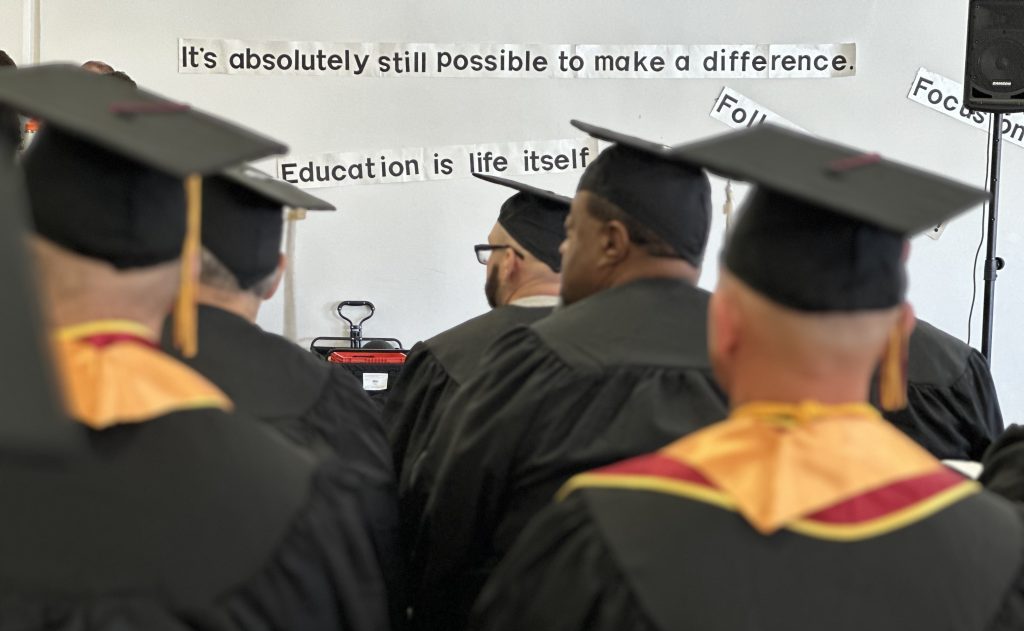Most students will go on to pursue bachelor’s degree
RJ Donovan Correctional Facility (RJD) hosted a graduation ceremony for 22 incarcerated students who earned their associate degrees from Southwestern College (SWC). Most of the graduates will go on to pursue a bachelor’s degree with the University of California, Irvine (UCI).
The Oct. 4 graduation exemplifies CDCR’s commitment in providing “grade school to grad school opportunities” to incarcerated students, helping them advance to higher levels of academic programming and meet their rehabilitative goals.
“We know that college changes lives and can be transformative,” said CDCR Secretary Jeff Macomber. “We are thrilled that the graduates today are using these opportunities to positively transform not only themselves, but also inspire those around them to do the same.”
The graduation was attended by California Community Colleges Deputy Chancellor Dr. Daisy Gonzales and Shannon Swain, Superintendent of CDCR’s Office of Correctional Education, as well as SWC and UCI leadership.
The graduation and success of the students was made possible by collaborative efforts between CDCR and California’s public higher education system.
Southwestern College
The associate’s degree recipients were a part of SWC’s Restorative Justice Program which provides face-to-face instruction to incarcerated students at RJD.
Since its inception, Southwestern College has served more than 1,500 students at the institution, helping them earn degrees and certificates in:
- business administration
- liberal arts
- communications
- American Sign Language
- and sociology.
“Being system-impacted myself, I understand first-hand the importance of the Restorative Justice Program and its power to truly shape the lives of incarcerated individuals seeking to better themselves,” said Raquel Funches, M.A. Interim Director of Restorative Justice & Other Off-Campus Programs. “We are proud to provide higher education opportunities to incarcerated students who are focused on their education, well-being and commitment to a better future.”
UC Irvine’s LIFTED program
Leveraging Inspiring Futures Through Educational Degrees (LIFTED), is the first in-prison BA-degree completion program in the University of California system. Piloted at UCI, LIFTED enables incarcerated individuals to apply to transfer into UCI as juniors and earn a bachelor’s degree from UCI while serving their sentence. Building on recent admission successes, and support from the state legislature, the LIFTED program will soon be replicated at UC Campuses throughout the state.
“UC Irvine’s LIFTED program congratulates SWC’s 2023 graduates and looks forward to welcoming many of them into our B.A. degree program in Sociology,” said Keramet Reiter, Director of the program. “While we know that investing in all higher education opportunities pays off — in terms of higher post-incarceration employment and lower recidivism — our LIFTED team has seen firsthand how pursuing a UC bachelor’s degree has additional and significant individual benefits, helping students to imagine a different future, preparing students to attend professional and graduate school, and inspiring their non-incarcerated family members to reconsider higher education opportunities, too.”
CDCR’s ‘grade school to grad school’ commitment
CDCR partners with California’s public higher education system to offer associate, bachelor’s and master’s degrees through California community colleges, the California State University, and the University of California. About 13.5% of the entire incarcerated population are enrolled in college courses.
Education as a powerful rehabilitative tool
Providing education in prison is proven to reduce recidivism rates and is associated with higher employment rates and improved public safety.
A study from the RAND Corporation, funded by the Department of Justice, found that incarcerated individuals who participated in correctional education were 48% less likely to return to prison within three years.
RAND also estimated that for every dollar invested in correctional education programs, four to five dollars are saved on three-year re-incarceration costs.
By Pedro Calderón Michel, Deputy Press Secretary
Read more rehabilitation stories.
Learn more about the California Model on the CDCR website.
Follow CDCR on YouTube, Facebook, X (formerly Twitter). Listen to the CDCR Unlocked podcast.
